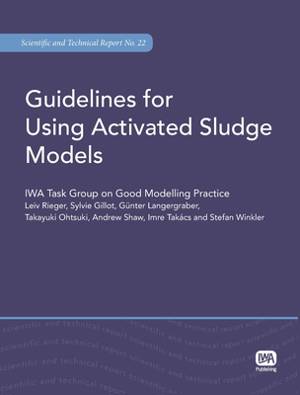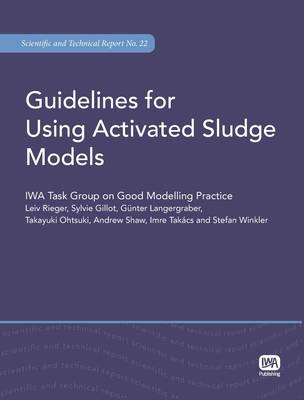
- Afhalen na 1 uur in een winkel met voorraad
- Gratis thuislevering in België vanaf € 30
- Ruim aanbod met 7 miljoen producten
- Afhalen na 1 uur in een winkel met voorraad
- Gratis thuislevering in België vanaf € 30
- Ruim aanbod met 7 miljoen producten
Zoeken
Guidelines for Using Activated Sludge Models
Leiv Rieger, Sylvie Gillot, Guenter Langergraber, Takayuki Ohtsuki, Andrew Shaw, Imre Takacs, Stefan Winkler
€ 138,45
+ 276 punten
Omschrijving
Mathematical modelling of activated sludge systems is used widely for plant design, optimisation, training, controller design and research. The quality of simulation studies varies depending on the project objectives, finances and expertise available. Consideration has to be given to the model accuracy and the amount of time required carrying out a simulation study to produce the desired accuracy. Inconsistent approaches and insufficient documentation make quality assessment and comparison of simulation results difficult or almost impossible. A general framework for the application of activated sludge models is needed in order to overcome these obstacles.
The genesis of the Good Modelling Practice (GMP) Task Group lies in a workshop held at the 4th IWA World Water Congress in Marrakech, Morocco where members of research groups active in wastewater treatment modelling came together to develop plans to synthesize the best practices of modellers from all over the world. The most cited protocols were included in the work, amongst others from: HSG (Hochschulgruppe), STOWA, BIOMATH and WERF. The goal of the group is to set up an internationally accepted framework to deal with the ASM type models in practice. This framework shall make modelling more straightforward and systematic to use especially for practitioners and consultants. Additionally, it shall help to define quality levels for simulation results, a procedure to assess this quality and to assist in the proper use of the models. The framework will describe a methodology for goal-oriented application of activated sludge models demonstrated by means of a concise guideline about the procedure of a simulation study and some illustrative case studies. The case studies shall give examples for the required data quality and quantity and the effort for calibration/validation with respect to a defined goal. The final report will include an extended appendix with additional information and details of methodologies.
Additional features in Guidelines for Using Activated Sludge Models include a chapter on modelling industrial wastewater, an overview on the history, current practice and future of activated sludge modelling and several explanatory case studies. It can be used as an introductory book to learn about Good Modelling Practice (GMP) in activated sludge modelling and will be of special interest for process engineers who have no prior knowledge of modelling or for lecturers who need a textbook for their students. The STR can also be used as a modelling reference book and includes an extended appendix with additional information and details of methodologies.
Scientific and Technical Report No. 22
The genesis of the Good Modelling Practice (GMP) Task Group lies in a workshop held at the 4th IWA World Water Congress in Marrakech, Morocco where members of research groups active in wastewater treatment modelling came together to develop plans to synthesize the best practices of modellers from all over the world. The most cited protocols were included in the work, amongst others from: HSG (Hochschulgruppe), STOWA, BIOMATH and WERF. The goal of the group is to set up an internationally accepted framework to deal with the ASM type models in practice. This framework shall make modelling more straightforward and systematic to use especially for practitioners and consultants. Additionally, it shall help to define quality levels for simulation results, a procedure to assess this quality and to assist in the proper use of the models. The framework will describe a methodology for goal-oriented application of activated sludge models demonstrated by means of a concise guideline about the procedure of a simulation study and some illustrative case studies. The case studies shall give examples for the required data quality and quantity and the effort for calibration/validation with respect to a defined goal. The final report will include an extended appendix with additional information and details of methodologies.
Additional features in Guidelines for Using Activated Sludge Models include a chapter on modelling industrial wastewater, an overview on the history, current practice and future of activated sludge modelling and several explanatory case studies. It can be used as an introductory book to learn about Good Modelling Practice (GMP) in activated sludge modelling and will be of special interest for process engineers who have no prior knowledge of modelling or for lecturers who need a textbook for their students. The STR can also be used as a modelling reference book and includes an extended appendix with additional information and details of methodologies.
Scientific and Technical Report No. 22
Specificaties
Betrokkenen
- Auteur(s):
- Uitgeverij:
Inhoud
- Aantal bladzijden:
- 287
- Taal:
- Engels
- Reeks:
Eigenschappen
- Productcode (EAN):
- 9781843391746
- Verschijningsdatum:
- 14/09/2012
- Uitvoering:
- Paperback
- Formaat:
- Trade paperback (VS)
- Afmetingen:
- 189 mm x 246 mm
- Gewicht:
- 539 g

Alleen bij Standaard Boekhandel
+ 276 punten op je klantenkaart van Standaard Boekhandel
Beoordelingen
We publiceren alleen reviews die voldoen aan de voorwaarden voor reviews. Bekijk onze voorwaarden voor reviews.











